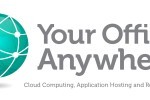Cloud hosted desktops make Bring Your Own Device a flexible, popular, cheap and secure option for many businesses.
Yes, I did say secure. I’ve listened to many heated discussions about BYOD over the years and while most people can see the benefits of flexibility, productivity and employee morale the concerns over security and manageability often shackle the business to the status quo.However, hosted desktops or hosted applications can allay many of the data security officer’s worries and provide the user with a familiar working environment regardless of location or device.
Employees are becoming more mobile as connection speeds are increasing and expect to be able to work from hotels, trains and home just as they do in the office. They want their mobile device to be their primary one, very often opting to use their own phones and tablets in preference to the company desktop.Forward thinking companies are embracing this new way of working, it has the potential to cut costs as they are not supplying users with multiple devices, there is also an increase in productivity as employees and company owners can effectively work during their daily commute, or at home in the evening, and on devices that they are totally familiar with. It is rare to find a small business owner who doesn’t at least work on his or her emails while on holiday, with hosted desktops they can work on any application.
Hosted desktops are part of the modern cloud portfolio. Working like a normal PC desktop, the business applications used by the company’s workforce are installed on a cloud based hosted terminal server and connect to the company’s databases and documents which are also on the same hosted server. This is a point worth re-emphasising; all the data, documents, and applications all reside on the cloud server, so there is no need to have any data or any applications on the user’s device. This provides a lot of benefits:If a device is stolen the company’s data is not. Even if there was not a security password on the device, the hosted desktop user account can be disabled or password changed within minutes.
Lost or faulty devices can be replaced and the user back up and running very quickly, without the need to reinstall dozens of applications.The desktop environment and applications are the same regardless of which device the user uses to run their hosted desktop If internet connection is lost, say while working on a train, the session continues to run on the server. As soon as internet is back the user can continue where they left off, even if they haven’t saved their documents.
Data is backed up regularly throughout the day, so even if a device was lost, stolen or broken, the presentation the user was working on all evening is still safe.Companies adopting a BYOD policy do need to consider and implement corporate wide security policies, which may include ensuring devices are password protected, and users resist the temptation to copy data locally. They should also ensure their hosted desktop provider uses secure connections (https) as users will commonly connect on unsecure wi-fi networks.
All in all the hosted desktop tips the balance firmly in favour of adopting a BYOD policy and give modern, mobile companies, of any size, the flexibility and security demanded by the business.Enjoyed this? Read more from Your Office Anywhere






















